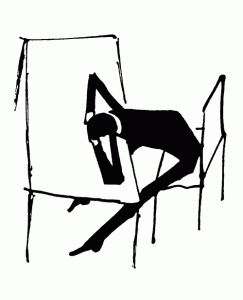Power Quote
Power Quote: Kafka on writing

“It is, in fact, an intercourse with ghosts, and not only with the ghost of the recipient but also with one’s own ghost which develops between the lines of the letter one is writing and even more so in a series of letters where one letter corroborates the other and can refer to it as a witness.”
— Franz Kafka, from a letter to Milena
I suspect by “letters” he means, generically, the written word, though he could also be referring to letters, the medium with which he is writing to Milena — or, and this is my fancy, he could mean the letters which make up words themselves, thus dramatically altering exactly what is “[in]between the lines” and their respective “corroborations,” a funny yet telling invocation which hints at some complicity, as if writing is a shameful lie. His “intercourse with ghosts,” short of necrophilia, simply tells of a man who replaced love with words. (One should see desire in the pulp of paper.) Think about Kafka long enough, and you enter a dark tunnel. Don’t think about him, and your world too perfect, untouched.
Tags: Kafka, letters to Milena

The letter you quote misses a key sentence before the first sentence: “The easy possibility of letter-writing must — seen merely theoretically — have brought into the world a terrible disintegration of souls.” Granted, it spells out the gleeful interpretive possibilities you introduce. But if we’re talking about what lies “between the lines,” then it seems only fair to poor Franz to offer more than just a snippet of context.
But no worries. Franz is just getting started, hardly suspecting that his ghosts would be dissected and his guts would be flailed about across a medium he could never possibly anticipate (although he does consider, quite appositely, the technologies that came before). There is this just after your selected quote:
“How on earth did anyone get the idea that people could communicate by letter! Of a distant person one can think, and of a person who is near one can catch hold — all else goes beyond human strength. Writing letters, however, means to denude oneself before the ghosts, something for which they greedily wait. Written kisses don’t reach their destination, rather they are drunk on the way by the ghosts. It is on this ample nourishment that they multiply so enormously. Humanity senses this and fights against it in order to eliminate as far as possible the ghostly element between people and create a natural communication, the peace of souls, it has invented the railway, the motorcar, the aeroplane. But it’s no longer any good, these are evidently inventions being made at the moment of crashing. The opposing side is so much calmer and stronger; after the postal service it has invented the telegraph, the telephone, the radiograph. The ghosts won’t starve, but we will perish.”
The letter you quote misses a key sentence before the first sentence: “The easy possibility of letter-writing must — seen merely theoretically — have brought into the world a terrible disintegration of souls.” Granted, it spells out the gleeful interpretive possibilities you introduce. But if we’re talking about what lies “between the lines,” then it seems only fair to poor Franz to offer more than just a snippet of context.
But no worries. Franz is just getting started, hardly suspecting that his ghosts would be dissected and his guts would be flailed about across a medium he could never possibly anticipate (although he does consider, quite appositely, the technologies that came before). There is this just after your selected quote:
“How on earth did anyone get the idea that people could communicate by letter! Of a distant person one can think, and of a person who is near one can catch hold — all else goes beyond human strength. Writing letters, however, means to denude oneself before the ghosts, something for which they greedily wait. Written kisses don’t reach their destination, rather they are drunk on the way by the ghosts. It is on this ample nourishment that they multiply so enormously. Humanity senses this and fights against it in order to eliminate as far as possible the ghostly element between people and create a natural communication, the peace of souls, it has invented the railway, the motorcar, the aeroplane. But it’s no longer any good, these are evidently inventions being made at the moment of crashing. The opposing side is so much calmer and stronger; after the postal service it has invented the telegraph, the telephone, the radiograph. The ghosts won’t starve, but we will perish.”
the feature is called “power quote,” not power excerpt, but thank you for showing our readers the correct way
the feature is called “power quote,” not power excerpt, but thank you for showing our readers the correct way
letters to milena is one of my all-time fave books. love that early letter where he calls fat people “capitalists of airspace” and the only truly useful people (his argument being that the provide shade in the south, and warmth in the north).
letters to milena is one of my all-time fave books. love that early letter where he calls fat people “capitalists of airspace” and the only truly useful people (his argument being that the provide shade in the south, and warmth in the north).
Can’t believe this link still works . . . Town Hall, NYC, 1998. EL Doctorow, DFW, Sontag, Auster talking about Kafka . . .
http://www.nytimes.com/books/98/07/19/specials/kafka.html?_r=1
My laughs and coughs can probably be heard. Trained in from NJ and scalped a ticket at the door like a common Kafka groupie.
Can’t believe this link still works . . . Town Hall, NYC, 1998. EL Doctorow, DFW, Sontag, Auster talking about Kafka . . .
http://www.nytimes.com/books/98/07/19/specials/kafka.html?_r=1
My laughs and coughs can probably be heard. Trained in from NJ and scalped a ticket at the door like a common Kafka groupie.